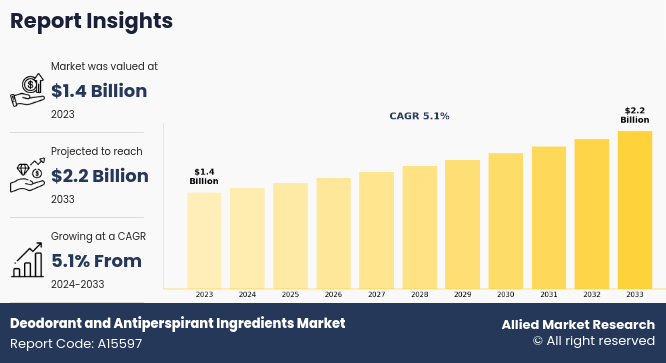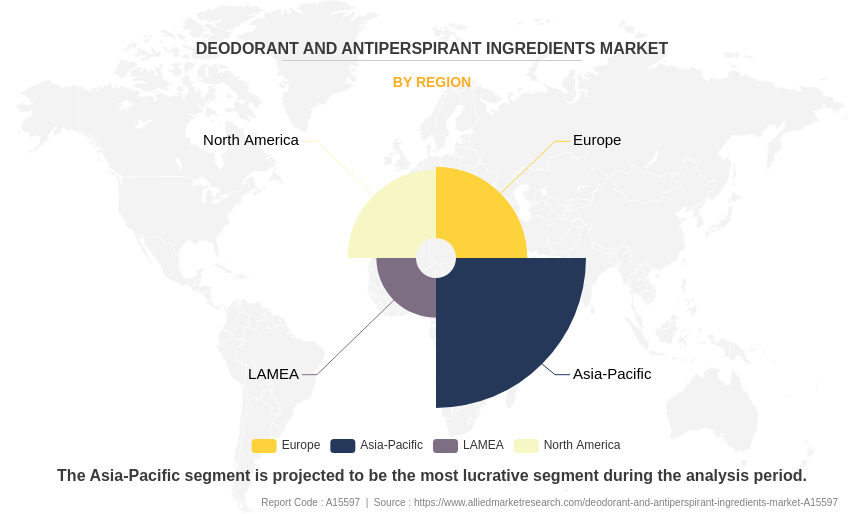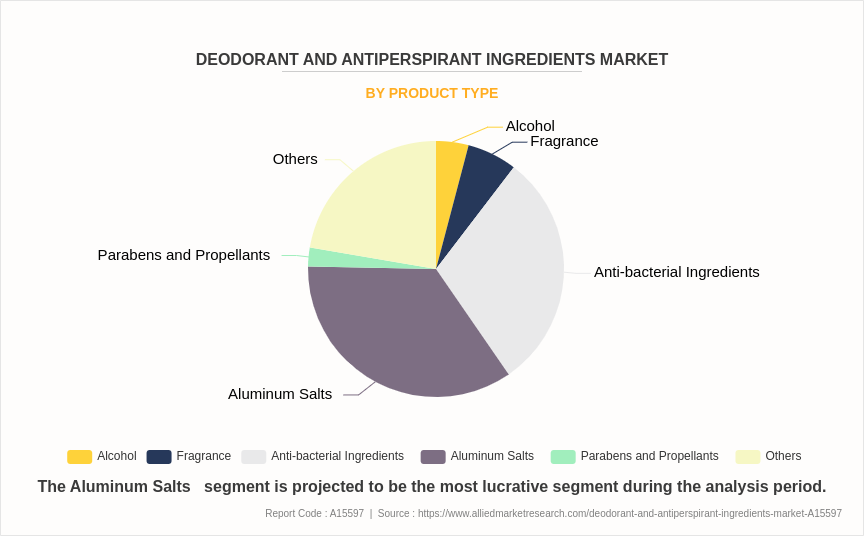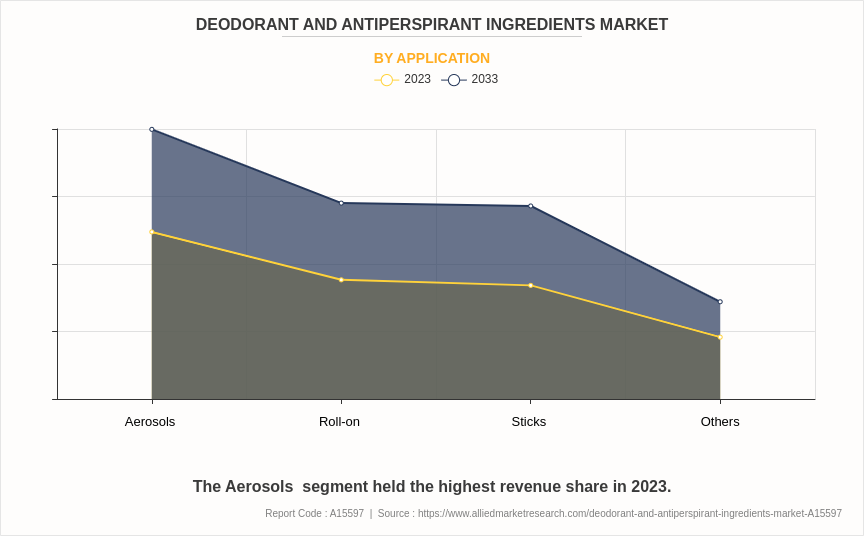Deodorant And Antiperspirant Ingredients Market Research, 2033
The global deodorant and antiperspirant ingredients market size was valued at $1.4 billion in 2023, and is projected to reach $2.2 billion by 2033, growing at a CAGR of 5.1% from 2024 to 2033.

Introduction
Deodorants and antiperspirants are personal care products designed to reduce body odor and control sweating. Deodorants primarily work by neutralizing or masking the odor caused by bacteria on the skin. Common ingredients include antimicrobial agents such as triclosan or alcohol), fragrance compounds, and moisturizers. Antiperspirants reduce sweating by temporarily blocking sweat glands. The most common active ingredients in antiperspirants are aluminum-based compounds such as aluminum chloride, aluminum zirconium, or aluminum chlorohydrate. These ingredients form a gel-like plug in the sweat ducts, preventing sweat from reaching the skin's surface. Both products may also contain additional ingredients such as emollients for skin care and preservatives to extend shelf life.
Key Takeaways
- The global deodorant and antiperspirant ingredients market is highly fragmented, with several players including Kalichem s.r.l., Elementis PLC, Univar Solutions LLC., Arkema, Ashland, BASF SE, Givaudan, Lucas Meyer Cosmetics, Dow, and Symrise.
- More than 4,765 product literatures, industry releases, annual reports, and other such documents of major industry participants along with authentic industry journals, trade associations' releases, and government websites have been reviewed for generating high-value industry insights.
- The study integrated high-quality data, expert opinions and analysis, and crucial independent perspectives. This research approach aims to provide a balanced view of global markets and deodorant and antiperspirant ingredients market overview, assisting stakeholders in making informed decisions to achieve their most ambitious growth objectives.
- Deodorant and antiperspirant ingredients market news and key industry trends are also included in the report.
Market Dynamics
The deodorant and antiperspirant ingredients industry is driven by increasing awareness of personal hygiene and rising demand for long-lasting and effective products. Growth in urbanization and influence of lifestyle changes are also boosting the market, particularly in emerging economies. However, concerns about the safety of certain ingredients, such as aluminum compounds in antiperspirants pose significant restraints.
Nevertheless, opportunities in the market include the development of innovative, eco-friendly formulations and the growth in preference for natural ingredients, which cater to the demand for safer and sustainable personal care products. The shift toward natural and organic products in personal care has significantly influenced the deodorant and antiperspirant market. Consumers are increasingly seeking products with plant-based and hypoallergenic ingredients, driven by a desire for safer and more sustainable options. This trend has influenced brands to innovate, integrating natural components that offer both effectiveness and softness on the skin.
For instance, natural deodorants now often feature ingredients such as baking soda, essential oils, and plant extracts, which provide odor protection without synthetic chemicals. Major developments in this include the introduction of deodorants formulated with organic aloe vera and chamomile, known for their soothing properties, and advancements in packaging that emphasize eco-friendliness. The rise of certifications such as the U.S. Department of Agriculture Organic further highlights the commitment to natural and organic standards, reinforcing consumer trust and expanding market opportunities. As brands continue to align their offerings with these evolving consumer preferences, the growth of natural and organic deodorant and antiperspirant ingredients is expected to accelerate, reforming the personal care landscape with healthier and more environmentally conscious choices.
Segments Overview
The deodorant and antiperspirant ingredients market is segmented on the basis of product type, application, and region. On the basis of product type, the market is categorized into alcohol, fragrance, anti-bacterial ingredients, aluminum salts, parabens and propellants, and others. By application, the market is classified into aerosols, roll-on, sticks, and others. Region-wise, the deodorant and antiperspirant ingredients market share is studied across North America, Europe, Asia-Pacific, and LAMEA.

Asia-Pacific was the highest revenue contributor in 2023, growing with a CAGR of 5.4%. Increased disposable income across Asia-Pacific countries has led to higher consumer spending on personal care and grooming products, including deodorants and antiperspirants. As disposable incomes rise, consumers are more willing to invest in premium and branded personal care products. Rapid urbanization in countries such as China and India, is contributing to higher demand for personal care products. Urban populations tend to have greater exposure to Western lifestyles and grooming habits, driving demand for deodorants and antiperspirants. According to the United Nations, the population of Asia-Pacific is expected to reach approximately 4.7 billion by 2030, contributing to higher demand for consumer goods including personal care products.
Innovations in deodorant and antiperspirant ingredients, such as natural and organic formulations, are driving market growth. Consumers are increasingly seeking products with natural ingredients that are free from harmful chemicals. The expansion of retail channels, including online platforms and modern retail formats, has made deodorant and antiperspirant products more accessible to consumers across the Asia-Pacific region. E-commerce growth has particularly facilitated access to a wider range of products. Moreover, the India Brand Equity Foundation (IBEF) indicates that the personal care market in India, including deodorants and antiperspirants, was valued at approximately $10 billion in 2023 and is expected to witness significant growth over the next few years.

The aluminum salts segment was the highest revenue contributor to the market, growing with a CAGR of 5.1%. Aluminum salts, such as aluminum chloride, aluminum chlorohydrate, and aluminum zirconium compounds, are key ingredients in antiperspirants designed to reduce sweating. These compounds work by forming a gel-like plug within the sweat ducts, which temporarily blocks the flow of sweat to the skin's surface. This mechanism significantly reduces perspiration and helps keep the skin dry. Aluminum salts are renowned for their effectiveness in controlling sweat and are commonly used in a range of antiperspirant products. Their ability to provide long-lasting protection makes them a popular choice in personal care formulations aimed at managing excessive sweating and maintaining dryness.
The demand for effective sweat control solutions continues to grow, as consumers seek products that offer reliable, long-lasting protection. Aluminum salts are valued for their proven efficacy in reducing perspiration, which fuels their widespread use. In addition, advancements in formulation technology have enhanced the performance and safety profile of aluminum salts, contributing to their continued popularity. Increased consumer awareness and the need for high-performance antiperspirants in both every day and high-activity contexts further drive the market growth. Despite some health concerns associated with aluminum salts, ongoing research and innovation aim to address these issues and maintain consumer trust, ensuring that aluminum salts remain a significant component in the deodorant and antiperspirant ingredients market growth.

The aerosols segment was the highest revenue contributor to the market, growing with a CAGR of 4.9%. Aerosols designed for body odor control and fragrance primarily focus on masking or eliminating unpleasant smells while delivering a pleasant scent. The active ingredients in these products, such as antibacterial agents such as triclosan, work to neutralize or kill odor-causing bacteria that thrive in the underarm area, where sweat accumulates. These bacteria break down sweat into acids, which are responsible for body odor.
The growing demand for deodorants and antiperspirants, particularly in aerosol form, is driven by increasing consumer awareness of personal hygiene and a preference for convenient, quick-application products. As lifestyles become busier, aerosols offer a fast, effective way to control sweat and body odor, making them popular across diverse demographic groups. The rise in active lifestyles, coupled with warmer climates in many regions, has also contributed to this demand. In addition, the market is seeing a trend toward more specialized formulations, such as those catering to sensitive skin or offering long-lasting protection, which further fuels the need for innovative ingredients in these products. This demand is pushing manufacturers to continuously develop and incorporate advanced antibacterial agents, skin conditioners, and appealing fragrances to meet consumer expectations and maintain competitiveness in the market.
Competitive Analysis
The major companies profiled in this report include Kalichem s.r.l., Elementis PLC, Univar Solutions LLC., Arkema, Ashland, BASF SE, Givaudan, Lucas Meyer Cosmetics, Dow, and Symrise. Nowadays, the key manufacturers operating in the deodorant and antiperspirant ingredients market have adopted strategies such as product innovation, joint venture, expansion, partnership, agreement, investment, and collaboration to increase their market share.
Key Benefits For Stakeholders
- This report provides a quantitative analysis of the market segments, current trends, estimations, and dynamics of the deodorant and antiperspirant ingredients market analysis from 2023 to 2033 to identify the prevailing deodorant and antiperspirant ingredients market opportunities.
- The market research is offered along with information related to key drivers, restraints, and opportunities.
- Porter's five forces analysis highlights the potency of buyers and suppliers to enable stakeholders make profit-oriented business decisions and strengthen their supplier-buyer network.
- In-depth analysis of the deodorant and antiperspirant ingredients market segmentation assists to determine the prevailing market opportunities.
- Major countries in each region are mapped according to their revenue contribution to the global market.
- Market player positioning facilitates benchmarking and provides a clear understanding of the present position of the market players.
- The report includes the analysis of the regional as well as global deodorant and antiperspirant ingredients market trends, key players, market segments, application areas, and market growth strategies.
Deodorant and Antiperspirant Ingredients Market Report Highlights
| Aspects | Details |
| Market Size By 2033 | USD 2.2 billion |
| Growth Rate | CAGR of 5.1% |
| Forecast period | 2023 - 2033 |
| Report Pages | 240 |
| By Product Type |
|
| By Application |
|
| By Region |
|
| Key Market Players | Givaudan, Kalichem s.r.l., Lucas Meyer Cosmetics, Univar Solutions LLC., BASF SE, Arkema, Elementis PLC, Symrise, Ashland, Dow |
Analyst Review
According to the opinions of various CXOs of leading companies, the deodorant and antiperspirant ingredients market is expected to witness increased demand during the forecast period owing to rise in global awareness about personal hygiene and grooming. Also, there is a growing preference for personal care products that offer multiple benefits, such as deodorizing, moisturizing, and skin care, thereby driving the development of advanced formulations.
Further, technological advancements in ingredient technology have revolutionized the deodorant and antiperspirant industry by making products more effective and skin friendly. Innovations in this field have led to the development of advanced active ingredients that enhance performance, such as improved odor-neutralizing agents and more efficient sweat-blocking compounds. In addition, new delivery systems and encapsulation techniques allow for the gradual release of these ingredients, ensuring extended efficacy and consistent protection. These advancements also focus on creating formulations that are gentler on the skin, reducing irritation and sensitivity. As consumer preferences evolve towards products that are both highly effective and gentle, these technological improvements help meet these demands, offering users a superior experience and ensuring that brands remain competitive in a dynamic market.
The deodorant and antiperspirant ingredients market is driven by increasing awareness of personal hygiene and rising demand for long-lasting and effective products.
Aerosols is the leading application of Deodorant and Antiperspirant Ingredients Market.
Asia-Pacific is the largest regional market for Deodorant and Antiperspirant Ingredients.
The deodorant and antiperspirant ingredients market was valued at $1.4 billion in 2023, and is estimated to reach $2.2 billion by 2033, growing at a CAGR of 5.1% from 2024 to 2033.
The major companies profiled in this report include Kalichem s.r.l., Elementis PLC, Univar Solutions LLC., Arkema, Ashland, BASF SE, Givaudan, Lucas Meyer Cosmetics, Dow, and Symrise.
Loading Table Of Content...
Loading Research Methodology...



